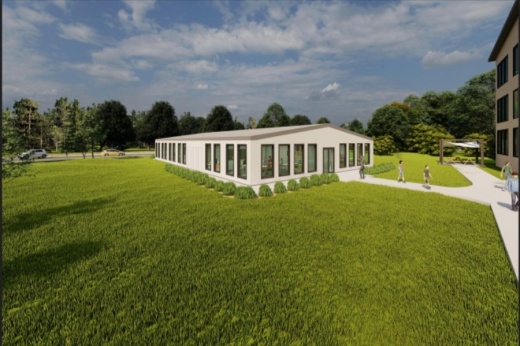According to Mike Colby, executive chair and CEO of Brodie Modular, who is also a Westlake resident, the modular buildings will provide 12,500 square feet of space. There will be 12-14 classrooms with accommodations for 25 students, restrooms for approximately 175 students, two private co-ed bathrooms for teachers, separate private areas for administrative offices in each building, charging stations for devices and Wi-Fi access points.
“We’re proposing a solution to replace the portables at a fixed cost of $3.5 million by Aug. 1, guaranteed by me,” Colby said. “I believe that the Aug. 1 deadline is essential. The liability assumed by housing students in these [current] structures, it doesn’t make any sense.”
Westlake Academy is a charter school wholly owned and operated by the town of Westlake. The school offers all three programs of the International Baccalaureate curriculum: Primary Years Programme, Middle Years Programme and the Diploma Programme. In 2011, three used modular buildings of 4,200 square feet with six classrooms were added to the campus. In 2013, three additional modular buildings were added to the campus, totaling six portable buildings with 12 classrooms and 8,400 square feet.
Health and safety issues have arisen due to the age and condition of the current portable buildings. Council Member David Quint read an email from a teacher who works in one of portable buildings.
“I’ve had to endure the smell of a dead rodent for over two months. When the air conditioner comes on, my wall vibrates, making empty chairs and desks vibrate. Everyone is aware of the safety risks from weather or the unthinkable. Also, it is hard to entice a new teacher to come to Westlake Academy and work in a portable,” Quint said, reading from the email.
Many residents packed council chambers not because they do not want to find a solution to the portables, but because it seemed that council was not following due process by considering Brodie Modular. Their concerns were championed by Council Member Chandrika Dasgupta, who was concerned Brodie Modular was not part of the typical bidding process, that its bid is the highest of all the bids that the city is considering, that it has no experience with school construction, and that Colby has given donations to the school.
“Any public contract above $50,000 has to be publicly bid. Why are we even considering offering a contract to a one-year-old company with no experience in any public buildings without a competitive bidding process?” Dasgupta stated in a Facebook post prior to the meeting. “Isn’t this against the law?”
Staton Lowry, the city attorney for Westlake, clarified the legality issue of Brodie Modular’s bid during the council meeting.
“There are a number of exemptions when municipalities can go ahead and spend the money over $50,000 without going through the process,” Lowry said. “Two of those exemptions most likely would be to protect the health and safety of your residents, and the other one is called a solo or singular source.”
Lowry said due to the state of the current portables, they may be posing a student safety issue. He also said considering the way Brodie Modular would construct the new modular buildings, it might be the only source that could provide the components that the council is looking for.
Over the many months that council has been talking about replacing the portables, three companies have been considered for that work: RamTech, Mobile Modular and Brodie Modular. According to city documents, RamTech’s estimated bid is $2.9 million, and Brodie Modular’s is $3.5 million. Those numbers do not include $665,000 worth of furniture, fixtures and equipment costs that the town would incur no matter which bid is selected. Mobile Modular had yet to provide a bid at the time as of Feb. 16, according to the city.
While the cost difference of the bids was also an issue, Jed Theis, chief operating officer of Brodie Modular, explained that it is like trying to compare apples to oranges.
“I have 40 years in the industry. I’ve done preschools, and I’ve done high schools. I’ve built $20 billion [worth of buildings] in the industry,” Theis told the council. “These are not mobile homes that show up on tires. These are permanent structures with bulletproof windows. You don’t see any of the big, ugly mechanical systems because they’re not on the outside of it. The ones from [the other vendors] are on the outside. They do not have HEPA filters. They do not have fresh air intakes. They do not have the quality of a system we want for our children these days.”
The council voted 5-1 to approve the mayor to begin negotiations with Brodie Modular. Dasgupta was the lone dissenting voice.





